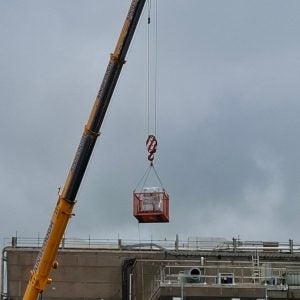In its financial statement, it reported its situation in more detail.
The Japanese economy in the first half of fiscal 2007 continued to grow at a steady pace driven by private-sector demand, which in turn was supported by expanded capital investment due to favorable corporate revenues, and firm personal consumption based on improved employment and income environments. Overseas, the U.S. economy gradually slowed while the European economy displayed stronger signs of recovery, Tadano said.
Under these operating circumstances, signs emerged in our industry that crane rental rates for domestic customers had bottomed out and were beginning to rebound, while domestic demand for construction cranes surged on the back of replacement demand. In overseas markets, exports to the North American market grew substantially while favorable conditions were maintained in the Middle East market, Tadano said.
During the current half-year period, in response to the recovery and expansion in demand for construction cranes in both domestic and overseas markets, the Group made an all-out effort to boost production and sales and promote its Mid-term Management Plan. In marketing, we primarily focused our resources on securing sales and sought to maintain or improve selling prices in the face of the rising costs of raw materials, such as steel lumber, that have continued unabated over the past two years, Tadano said.
In procurement and production, we continued our efforts to cut costs while seeking a balanced expansion in capacity amid a growing production burden with due consideration for suppliers, associated factories and our own production capacity, Tadano said.
As part of our initiatives to reorganize domestic plants, in June we began construction of the Tadano Tadotsu Factory (Tadotsu, Kagawa Prefecture; total construction cost: approximately 1.3 billion yen; scheduled start of operations: July 2007), and completed transferring all production of aerial platforms from our Shido Factory to the Takamatsu Factory by the end of September, Tadano said.
In addition, to achieve fundamental cost reductions and higher production efficiencies, we appointed specialists and launched the VE (Value Engineering) Project in April to reduce costs from the stage of development, and the Production Reform Project in June to boost production efficiency, Tadano said.
Domestic sales, bolstered by replacement demand for construction cranes, rose 110.7% to 40,014 million yen while overseas sales rose 144.2% to 28,529 million yen in line with the sharp increase in sales of construction cranes in the Middle East and North America. As a result, total sales grew substantially to 68,544 million yen, a 122.6% increase compared with the same period of the previous fiscal year. The ratio of overseas sales to total sales rose to 41.6%, exceeding the 40% mark for the first time, Tadano said.
Ordinary income rose 148.1% to 6,344 million yen due to increased sales as well as the accompanying enhancement in production efficiency and improved procurement environment. Interim net income rose 151.8% to 3,890 million yen, as the completed disposal of bad loans was within sight and we posted gains on the reversal of allowance for bad debts of 405 million yen as extraordinary income and posted disposal losses on fixed assets of 134 million yen as extraordinary loss. With respect to non-consolidated interim results, we completed restructuring the business of our sales subsidiaries and posted 1,000 million yen in special dividends from those subsidiaries as non-operating income and reversed 2,131 million yen in deferred tax assets related to allowances for investment losses and other losses. As a result, ordinary income was 6,283 million yen and interim net income 2,398 million yen, Tadano said.
Construction Cranes In the domestic market, sales of all terrain cranes grew steadily in addition to strong replacement demand centered on our mainstay 25-ton and 60-ton capacity rough terrain cranes. Consequently, sales of construction cranes rose substantially by 131.7% to 16,159 million yen compared with the same period of the previous fiscal year, Tadano said.
In overseas markets, sales increased considerably by 148.0% to 20,455 million yen compared with the same period of the previous fiscal year, mainly due to expanded sales in priority markets, including the Middle East and the United States, where demand surged on the back of active construction and capital investments, and Europe, where economic recovery is underway, Tadano said.
As a result, despite limitations on production capacity, total sales of construction cranes were 36,614 million yen, a sizeable increase of 140.3% compared with the same period of the previous fiscal year, Tadano said.
Truck Loader Cranes Sales grew steadily as we expanded marketing for cargo cranes amid a slowdown in replacement demand for trucks that meet new diesel emission regulations. As a result, sales of truck loader cranes rose to 8,964 million yen, up 113.0% compared with the same period of the previous fiscal year, Tadano said.
Outlook for the Full Year While the Japanese economy is expected to remain on a sustained recovery path driven by solid domestic demand centered on capital investment and personal consumption, some causes for concern remain, namely the North Korean situation, the impact on exports caused by a slowdown in the U.S. economy and fluctuations in crude oil prices and interest rates, Tadano said.
In view of the market environment surrounding Tadano, sales in the domestic market are expected to continue rising due to the strength of ongoing replacement demand for construction cranes, while sales of construction cranes in overseas markets are also expected to fare well, as we maintain a focused effort on expanding sales in Europe, in addition to the Middle East and the North American markets, Tadano said.
However, even as we strive to reorganize our domestic plants, we are also faced with the challenge of boosting production to shorten prolonged product delivery periods as well as improving product costs and raising selling prices to reinforce profitability. We are particularly seeking to further enhance quality and achieve fundamental cost reductions to prepare for a turnaround in future demand, Tadano said.
In fiscal 2007, we will maintain our uncompromising commitment to safety and quality in a continued effort from the previous fiscal year while at the same time directing all our energy toward accomplishing the goals of our Mid-Term Management Plan. Through these efforts, we are targeting consolidated sales of 162,000 million yen, with a 44% ratio of overseas sales to net sales, and ordinary income of 17,800 million yen for the fiscal year ending March 31, 2008, Tadano said.
The following is our current forecast for business results to March 31, 2007. These figures are based on foreign exchange rates of 105 yen to the dollar and 130 yen to the Euro. Sales- Y137 billion. Operating income- Y12.3 billion. Net Income- Y7.4 billion.






